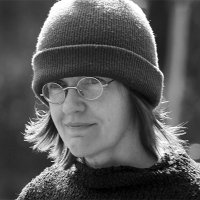Diane Stubbings

Diane Stubbings is a writer and critic based in Melbourne. Her plays have been shortlisted for a number of Australian and international awards, and staged in Sydney, Melbourne and New Zealand. She has written for Australian Book Review, The Australian, The Canberra Times, and the Sydney Review of Books. Her study of Irish Modernism was published by Palgrave. Diane has recently completed a PhD at VCA, University of Melbourne, investigating intersections between science and theatre.
In Feeling and Knowing: Making minds conscious, neuroscientist, psychologist, and philosopher Antonio Damasio asks us to imagine life without consciousness. We would, he argues, still have patterns of neurochemical, sense-derived information ‘flowing in our minds, but [that information] would be unconnected to us as singular individuals’.
... (read more)
In her novel Frankissstein (2019) – a reimagining of Mary Shelley’s Frankenstein (1818) that embraces robotics, artificial intelligence (AI), and transhumanism – Jeanette Winterson writes, ‘The monster once made cannot be unmade. What will happen to the world has begun.’ This observation might have served as an epigraph for her new book, 12 Bytes. Comprising twelve essays that rumina ... (read more)
The collective dislocation that followed the advent of Covid-19 generated (and continues to generate) a slew of books intended to make sense of the turmoil. Encompassing Slavoj Žižek’s anti-capitalist treatise Pandemic! (2020) and books for children such as Eoin McLaughlin and Polly Dunbar’s While We Can’t Hug (2020), the responses have ranged from considered attempts to apprehend the pand ... (read more)
Founded in 1831, the British Association for the Advancement of Science (BAAS) sought to redress impediments to scientific progress that arose in the aftermath of the Napoleonic Wars, determining that the BAAS would ‘give a stronger impulse and more systematic direction to scientific inquiry … [and] promote the intercourse of cultivators of science’.
... (read more)
In a recent interview, Italian physicist Carlo Rovelli confessed that the book he would most like to be remembered for is The Order of Time (2018), a work in which time, as it is commonly understood, ‘melts [like a snowflake] between your fingers and vanishes’. The Order of Time, Rovelli admits, only pretends to be about physics. Ultimately, it’s a book about the meaning of life and the comp ... (read more)
One of the blessings of Covid-19 lockdown was discovering the wildlife cameras streaming on the internet in real time. With a click it became possible to observe brown bears catching salmon in Alaska, sea lions clambering on and off a rocky beach in British Columbia, and white-bellied sea eagles nesting in an eyrie high in bushland on Sydney’s fringes. Watching newly fledged eaglets literally st ... (read more)
The announcement in June 2000 that a first draft of the human genome had been completed was rightly recognised as a landmark in scientific endeavour. Predictions were that the sequencing of the genome would allow for the pinpointing of genes responsible for conditions such as Alzheimer’s and heart disease, and lead to finely targeted, even personalised, treatments for a range of disorders. That ... (read more)
While climbing in British Columbia, Canadian writer and journalist Eva Holland becomes paralysed by fear. She has long been troubled by exposed heights, but this is different. What she experiences is an ‘irrational force’ that prevents her from moving. It is only the dogged encouragement of friends that allows her to make her tentative way back down the mountain.
The terror Holland confronts ... (read more)
In lectures delivered at Princeton University in November 2016, science historian Naomi Oreskes asked why, at a time when the epistemological and cultural relevance of science is subject to increasing doubt, we should still have confidence in science as our primary source of knowledge about the physical world. Why Trust Science? is the culmination of those lectures, and includes not only Oreskes ... (read more)
